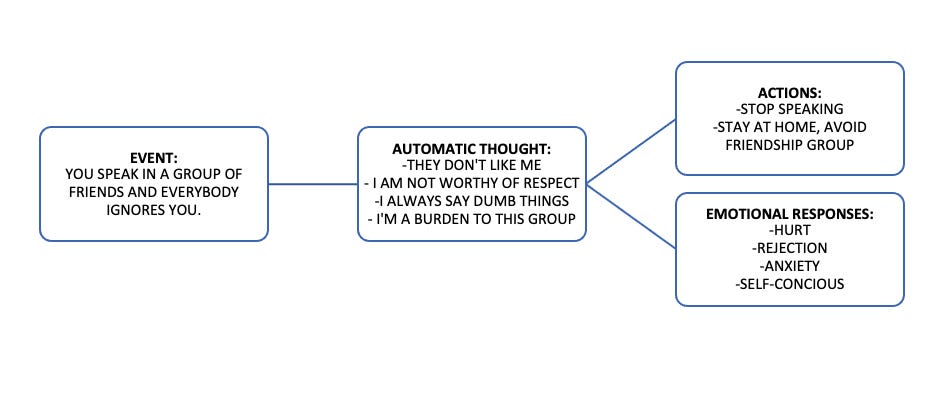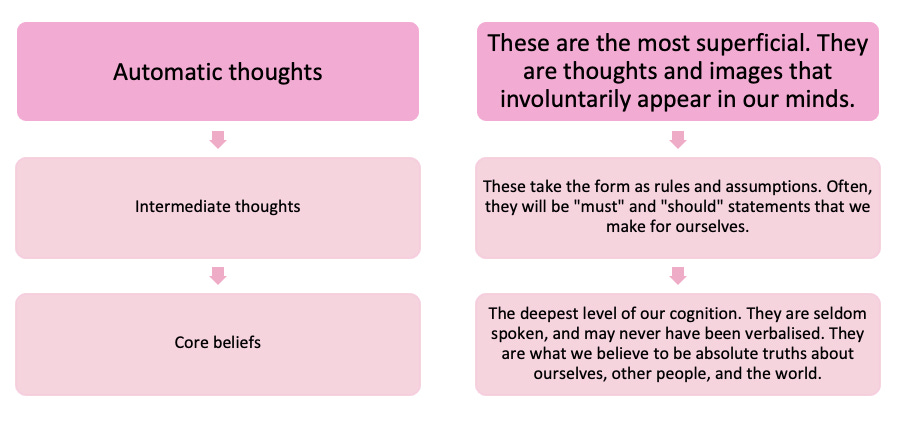SOUL THERAPY: FEELING LOST; HOW TO REWIRE YOUR BRAIN
Read this if you feel lost. It is a long post, but it is important so this one is free. We dive into a technique based on CBT that I have used and continuously use to control my mind absolutely.
Feeling Lost
You, the reader
Perhaps you have not noticed it. Maybe you do not wish to pay it any attention. After all, why would you, and why does it matter?
When you step outside and take some time to breathe in the chilling air of tranquillity and calmness, you will make a few observations if you really take the time to look. There are people – sort of. Humanoids going about their day. However, there is a certain apathy that permeates the air you breathe into your lungs. Seldom do you see a person who radiates a warmth that you can feel in your chest; rarely are you greeted with genuine vibrance. Nowadays, eye contact is rare, and when it is made, it is often uninviting. At worst, it is threatening. How can it be possible that, by every observable metric, this is the best time to be alive in human history – yet people carry such a heavy melancholy?
This is the current state of the collective consciousness, and those of you who pay attention to detail may sense this. Perhaps this is you. If so, I’m writing directly to you. I wholeheartedly promise you that this article is not a black pill. It is not one that contributes to such melancholy and gloom. In fact, quite the opposite. But you must act on it. I will show you how, but all I can do is show you. The rest is up to you, the reader. I’m going to teach you how to rewire your mind.
Trust me when I say that the recesses of your mind can be compared to an undiscovered goldmine. It is irresponsible to not explore it, but very few will. But first, allow me to connect with you, the future architect of your mind.
Truthfully, if you feel lost or dull, it is because your life needs to get worse. Until then, you will float aimlessly in the depressive purgatory reserved for the lukewarm. Your days will blend into one and feel the same. You will contribute to the melancholic collective consciousness. You will not have the drive to change anything until you have that monumental 'fuck this shit' moment. Before then, I cannot really inspire much change in you. Most of you reading may not have hit this point, and that’s fine, but remember these words when you do, and I’d encourage you to return because my posts will catalyse the change in your life.
Any moment that prompts the thought, 'Fuck this shit,' accumulates a compound interest. Some of them have already begun accumulating in your life, chipping steadily at your soul. If you aspire to sculpt the masterpiece that is your mind, then you must earnestly explore the very terrain where you intend to create it. As you read this, you likely have started to feel those emotions and recalled some of these events.
It’s that deep embarrassment when you voice your thoughts within a group of friends, only to find that nobody respects you enough to pause and listen – you are swiftly dismissed and brushed aside.
It’s when you try to articulate your thoughts, yet uncertainty clouds your mind and leaves you unsure of your own ideas. Sometimes, it feels like your own mind betrays you.
It’s that deep resentment that grows when your boss humiliates you at work, or that colleague humiliated you in front of everybody – you, a grown adult, submitted to an impotent infancy.
Once again, you find yourself ghosted in your situationship. You wonder why they keep losing interest.
It’s when you engage in laughter with your friends (if that is what you wish to call them) and discover that once again, you are the butt of everyone’s joke. If you play along, they might mercifully change the topic.
It’s when you keep choosing to stay with a person who does not respect you because that is all that you have. To you, the thought of loneliness is daunting – it might even be worse. Maybe.
It’s the occasional thought that arises in your head: why does nobody check up on me? But even when they do, you pause for a split second. You tell them you’re fine.
The days merge into one. Weeks pass you by. Upon returning home from your job, you think about how your contributions are minimal anyway. The company’s vision is not your own, and besides, you’re uncertain about what your vision actually is. As you face a few hours to yourself in the evening, you remember you must do it all over again tomorrow and you had better not be late. Same routine. If you just persevere until Friday, there is a promise of finally removing those chains for the weekend – you struck this deal. Perhaps you’ll have a drink or two, or three.
Being honest, you're not genuinely sad; in fact, you don't feel much at all.
As you rest your head at night, you find yourself replaying these moments repeatedly. In the stillness of the night, the realization dawns on you that life doesn't match the expectations you held growing up. It's not the way you envisioned it. You don't have much to lose, and you've reached a point where you simply don't care.
Allow me to be the first to congratulate you.
You've just found the courage to change your life.
My experience and why I’ve written this post.
Many people will tell you that there may be something intrinsically wrong with your brain. Neurochemical imbalance – can’t be helped, sorry. Take these pills. Go to therapy. They use magnets on your brain now, it’s great! This post is a whitepill, and the tale ends with a realistic optimism. In fact, those who use this in their life will realise how the technique completely transforms their lives.
I am not here to tell you that your problems are not real. I am not here to tell you that depression does not exist. It is real, and I have felt its firm and overwhelming grip on my psyche. Rather, I have experienced truly feeling nothing at all.
I worked in one of the most prominent institutions in the world, and I had worked exceptionally hard to get there. I should have felt grateful to be there, but during this time, I could not think. Literally could not think. The fog in my mind would not clear. My speech became sluggish, my creative aptitude diminished, and I did not perform well. I could feel the growing resentment from my colleagues as they continuously had to pick up my slack. Everything I did somehow became a mistake. I don’t know how I became the person who was taking L’s constantly but there I was. Mistake after mistake. Snide remarks aimed my way. Deservingly.
I would smile. I would put on a good face – especially when I drank, it turns out I’m quite the funny drunk, actually. But my smile was often empty. If I managed to muster it. Eventually, I left the job and decided to move back into my parent’s house for a few months. Admittedly I started to feel some semblance of shame. It sounds like a bad thing, but it is the opposite. I was no longer burdened with the affliction of anhedonia, and the insidious curse of Baldur had been lifted. I felt something. And if there is pain, there is hope.
In my family, there is no such thing as medicating for a psychiatric problem, there is room for high performance and figuring things out. I am exceptionally grateful for this mindset because if you can survive it, you thrive in it. I refused to admit to myself I had “depression” and to this day, I will still refuse to say that I had it. But I did feel depressed.
I would stare at the wall for hours each day. Intense breathwork and meditation for hours. It is absolutely not what I am about to recommend, but I used this time to explore the recesses of my mind. I am lucky, because in the grooves that line the gyri of my brain matter, I discovered treasures. Others who did not find their own treasures broke their minds in the process. If you have ever spoken to an institutionalised psychiatric patient, then you will know what that looks like. You will learn a lot from those conversations but that is not what I’ll write about today. Most importantly, I learned that I did not wish to share that fate.
I studied, a lot. It’s not unusual, I often do this, but the subject matter was not what I had learned in school or observed in nature. I don’t believe this will be close to my most interesting post on substack and in fact I didn’t want to share it, but most of my DMs on X have prompted me to write this for dozens of people who tell me of their mental struggles. So, I hope you might take value from this. Ok, enough blabbing!
REWIRE YOUR BRAIN
Introduction
It is entirely possible to rewire your brain. Without substances and without mentally castrating yourself in the office chair of a therapist charging you $200 per hour to talk about your childhood trauma for months. You do not need to rely on some herbs and “manifestation”, and you do not need to spend any money. AT ALL.
This method in this post is based on Cognitive Behavioural Therapy (CBT), which is popular and trained therapists use it, but few will tell you that you can do this by yourself. Even fewer people will tell you that a lot of these techniques for mindset such as going on retreats in a Himalayan Mountain to take psychedelics only to be hypnotised and speak affirmations, are based on the principles of CBT. Clinically, CBT can be more effective than medication for treating depression, but it has a lot of other uses too.
It is used for ADHD, Anxiety, Substance abuse, PTSD, Tics, internet addiction, and Schizophrenia. VERY EFFECTIVELY. But it is not just used to mend psychiatric ailments. Billionaires will pay tens of thousands to have CBT reshape their mind so that they can derive a euphoric joy from working. This investment is worth it, because once they reshape their mind, they make much more money than what they have spent on the therapy. It gets much darker than this actually and once again, I’ll go into those kinds of things in a subsequent post, but I want you to become familiar with the basic concepts first. If this is helpful to you, then feel free to sign up for paid subscription because my most intricate and intimate topics (sex, relationships, philosophy and the unspoken depths of the human condition) will be broken down there.
What is Cognitive Behavioural Therapy?
If you are a geek or a nerd, then you will not be overly impressed by the fact that I am going to refuse to use medical jargon. Especially because it is so simple that it does not need to be complicated.
Cognitive behavioural therapy (CBT) is a therapy based on the idea that your thought distortions lead to maladaptive behaviours which then manifest as psychological disorders.
The principle is an ancient one. Nearly 2000 years ago, the Greek philosopher Epictetus expressed this:
“Men are disturbed not by things, but by the principles and notions they form concerning things.”
Victor Frankl, a survivor of the Nazi death camps and the author of “Man’s Search for Meaning,” articulated a similar sentiment:
“Everything can be taken from a person except one thing: the last of the human freedoms – to choose one’s attitude in any given set of circumstances, to choose one’s own way.”
Importantly, the model is based on the knowledge that our thoughts, feelings, behaviour, and body sensations are all inter-related and can affect one another. Simply, what we do can affect what we think, which then can affect how we feel.
Ok, so the important thing here is the fact that all of these are inter-related and that is what leads to problems and psychological distress. If you imagine that this is a continuous chain, then you can appreciate that a problem in one area will inevitably lead to problems elsewhere. In the above example, if you were to take the actions to become a recluse or to stop speaking then you can imagine your feelings of self-consciousness and anxiety would only increase.
This same inter-relatedness will work in your favour. A deliberate change in one area can cause a cascade that positively impacts all other areas of this chain.
Cognition and levels of thinking
First, we must discuss the different levels of thinking or cognition. This is perhaps one of the most important aspects because once you manipulate this level you begin to warp reality, not just in your head but eventually in the real world as well. More on that later. There are 3 levels.
Examples:
Automatic thoughts - Writing a message to somebody that you have romantic or sexual interest in then immediately having the thought that they’ll start to lose interest in you as soon as you send it.
Intermediate thought - After a hurtful romantic relationship, you may have the underlying thought “I must always have my guard up, or else I will get hurt again.”
Core Belief - This are things rarely spoken
About yourself - I am stupid. I am useless. I am not unique. I am boring. I’m not funny. I can’t compete.
About the people: People are evil. People are uncaring. Everybody is cruel.
About the world: The world is doomed. This world is unfair. This world is punishing.
It’s key to note that all these different levels of cognition interact with each other.
The automatic thoughts that we have are determined by the core beliefs that we have. If a person has a negative core belief like “I am stupid” and does not score well on a test they may have an automatic thought that confirms this and think “I can’t do better than this” – they are automatically limited to achieve what they truly believe about themselves.
In this way, their thoughts will dictate their actions because they are less likely to study as much as the person who does not have this negative core belief about themselves. This perpetuates the cycle. Making them effectively stupid. You cannot outperform your core beliefs.
You know this is true because you have noticed a thought pattern that all the most successful people and greatest minds have. They force themselves into a positive cycle and will guard their minds viciously to maintain this. They are extremely quick to dispose of any negative talk, not because they are sensitive but because they recognise any assault on their psyche will have disastrous consequences. It could ruin their life.
This is not about making “affirmations” and it is not about “manifestation”, it is not a spiritual healing and you do not need to burn some candles and repeat things to yourself in a dark room in the hopes you will magically change. You must learn it, and you must earn it. You must hijack this system to the point in which your actions and thoughts become indistinguishable, and as a result you completely control your emotions and your outcome.
Steps at home (as in, you can do this right now)
1. Make a list of your core beliefs about yourself.
If this does not arouse emotion, then you have not done it correctly and you haven’t delved deep enough. Most will read this and think of surface thoughts or things that don’t really mean anything. But you really must get to your truest beliefs about yourself. You must confront your demons. It is impossible to enslave them without facing them first. If you truly believe you are worthless then write it down. If you think you are evil, then put that thought onto the paper. Your core beliefs must bleed into the pen, and you must smear this ink into the paper.
When I wrote my list of previous core beliefs I could not sleep. For the first time in my life, I had actualised the worst thoughts that I had about myself and it was met with an exceeding amount of troubling pain.
2. Identify the negative thoughts and list your evidence for them.
Build the case file. What is it that you do that reinforced these beliefs? If you believe you are stupid, then perhaps it is because you have not performed well in exams. Or you’ve always presented as the “funny and slow” friend.
WHEN do these thoughts appear? What situation occurs that triggers this inside of you? Is it when you are ignored? Is it when somebody insults you? Is it when your spouse raises a hand to strike you? Confront it. Write it.
3. Replace with productive thoughts.
Now you must identify the personality that you’d wish to curate. You are about to psyop yourself so you must know exactly what you’re aiming for. Your reality is going to shift in this direction, and it is important to be aware of this. You are an architect -you must know what you are about to sculpt.
You are intelligent. You are somebody who takes their health seriously. You are somebody who tends to win. You are someone who adapts to situations. Right now you get to decide, and you must guard this – ruthlessly.
4. Provide evidence for these thoughts.
Identify exactly what you must do for these to extend beyond the realm of delusion. The difference between delusion and reality is evidence. The more evidence you build towards this persona the stronger this new core belief will be until it is completely solidified.
Without action, this is worthless. It is impossible to simply think your way into this. This is the most important step. You must build irrefutable proof because your mind will fight it. It is easy for your brain to maintain homeostasis. Doubts will creep into your psyche, and you must allow your subconscious to argue your case. It is irresponsible to not provide your lawyer with evidence to support you.
5. Revisit this list often and craft your personality.
This will initially require a tremendous amount of upkeep. I have not promised it will be easy, nothing worth having ever is. But it is unbelievably effective, and it is ABSOLUTELY possible.
I’ve used this to describe how you can manage many psychological ailments but once you get better at this you can adapt this to any situation that you wish. When you see people use “hypnosis” or “affirmations” then it is this they are trying to tap into. Do not waste your money on this gibberish and flabbergast.
There is nothing in this world that you have complete control over, except your own mind.
I recently posted a short thread on Alex Hormozi. He has crafted a persona that works for his specific goal, and he viciously defends it. He guards his mind ruthlessly; he refuses any perceived attack on his core beliefs that he has put some much deliberate effort into curating. He is only one example of somebody who does this often and very publicly, but the truth is he is simply one of many.
Similarly, Steve Jobs publicly rejected “talk therapy” as he quickly understood how useless it was. He spent years figuring out how to control his own mind. Eventually he mastered this to such an extent that he could play with it fluidly. His control was so powerful that he even started to warp the realities of others around him. He coined the term “reality distortion field” because those around him would have their own core beliefs shift in his presence. His employees had to make secret signals and warnings to each other when they recognised that they were falling into his reality.
In fact, many of the greatest and most successful high achievers in history do this and I’ll give the in-depth analysis of these greats their own respective posts. Their minds are fascinating and you would do well to learn about them.
TLDR and Conclusion
The most effective management for psychological ailments such as depression, anxiety, ADHD, substance disorders etc. is Cognitive Behavioural Therapy and its variations. You can do this at home, and you do not need to pay somebody to do this for you. Ownership of your own mind is free. Your mind is the only thing that you have absolute control over, so you would do well to master this and guard it VICIOUSLY.
Cognitive Behavioural therapy has ancient origins, Epictetus an ancient philosopher alluded to this over 2000 years ago and the concept is extremely simple. Your thoughts, emotions and behaviours are completely intertwined. If you feel distress, or if you have negative thoughts about yourself then it is because there is a problem in this pipeline. To fix this, you must understand the fundamental principles and methodically break it down. Identify your core beliefs about yourself, build evidence to support your new beliefs and reinforce them with actions, constantly.
Once you master this you can craft your personality at will to achieve whatever goal that you wish. The greatest minds in history routinely did this, whether they were directly aware of it or not. Perhaps, it is easy to say “just workout, just study, just be happy” but anybody with any lived experience whatsoever will know that this is much easier said than done. It is much better for you, the architect, to sculpt your mind as you wish. Then life becomes very easy.
This is not medical advice. I am more pro-doctor than you would imagine, but I am very aware most will not go to see one. I believe it is better to be aware of effective and safe options available for you to take control of your own life. If any of this is helpful or you learned anything then feel free to join the paid subscription if you haven’t already! That Is where I’ll do a much deeper dive into more interesting topics that pertain to the human condition (sex, relationships, new philosophy, health, finance, and intellectual pursuits). Otherwise, if you think somebody might benefit from this then share this with them.
Love, peace, and guidance.
To read more:
1. Cognitive behavioural therapy (CBT): Royal College of Psychiatrists (no date) www.rcpsych.ac.uk. Available at: https://www.rcpsych.ac.uk/mental-health/treatments-and-wellbeing/cognitive-behavioural-therapy-(cbt)#:~:text=CBT%20has%20longer%20lasting%20effects,or%20CBT%20on%20its%20own.
2. Driessen, E., & Hollon, S. D. (2010). Cognitive behavioral therapy for mood disorders: efficacy, moderators and mediators. The Psychiatric clinics of North America, 33(3), 537–555. https://doi.org/10.1016/j.psc.2010.04.005
3. Roy-Byrne PP, Craske MG, Stein MB, et al. A Randomized Effectiveness Trial of Cognitive-Behavioral Therapy and Medication for Primary Care Panic Disorder. Arch Gen Psychiatry. 2005;62(3):290–298. doi:10.1001/archpsyc.62.3.290
4. Nadiga, D.N., Hensley, P.L. and Uhlenhuth, E.H. (2003), Review of the long-term effectiveness of cognitive behavioral therapy compared to medications in panic disorder. Depress. Anxiety, 17: 58-64. https://doi.org/10.1002/da.10084
5. Pan, M.-R. et al. (2019) ‘A comparison of efficacy between cognitive behavioral therapy (CBT) and CBT combined with medication in adults with attention-deficit/hyperactivity disorder (ADHD)’, Psychiatry Research, 279, pp. 23–33. doi:10.1016/j.psychres.2019.06.040.








Extremely based. Look forward to seeing more in the future!
I saw you tweet you’ve studied the mindsets and performances of the greats. Do you have a list of examples of core beliefs, self concepts and/or the internal dialogue of a man that wants to be a winner, powerful, strong and completely dominate in all aspects of life, just to get the ball rolling?
thanks again for the dope post